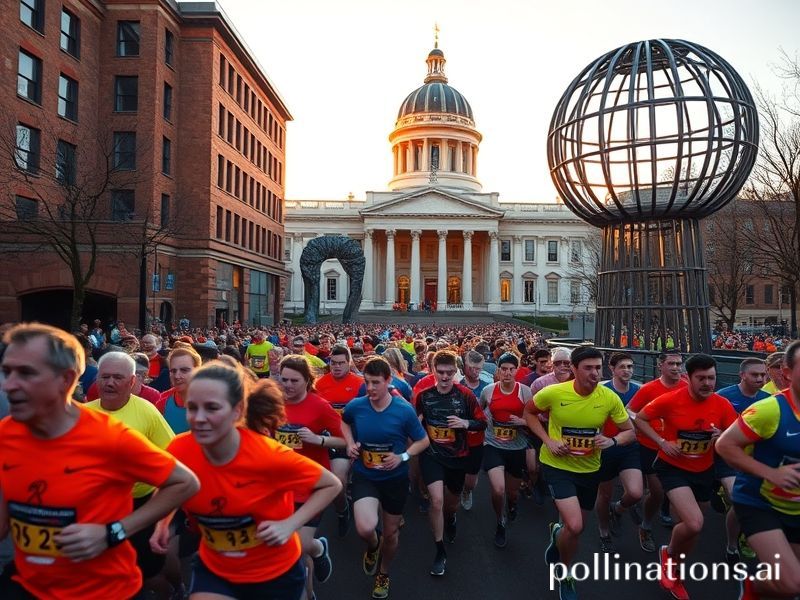Sheffield 10K: How a Yorkshire Fun-Run Became a Satirical Snapshot of the Entire Planet
Sheffield 10K: When a Yorkshire Jog Becomes a Geopolitical Mood Ring
By Our Man in the North, Still Wearing Last Year’s Medal Like a War Ribbon
Sheffield—city of stainless steel, Arctic-grade sarcasm, and a hill so steep it could double as a Swiss banking angle—recently hosted its annual 10-kilometre road race. On paper, the Sheffield 10K is just another mass-participation fun run: chip-timed, charity-branded, and generously lubricated with lukewarm electrolyte drink that tastes like battery acid mixed with regret. Yet viewed from the international nosebleed seats, the event is a perfect micro-drama of our fractured, overheated planet.
Consider the field: 6,000 runners, roughly the population of Liechtenstein if Liechtensteiners ever decided en masse that banking was too boring and compression socks were the future. Among them were Kenyan pacers earning modest appearance fees that still dwarf the annual income of their cousins back in Eldoret; Ukrainian surgeons raising pounds for field hospitals; and British pensioners in Viking helmets plodding for bowel cancer, because nothing says “awareness” like 82-year-old Derek dressed as a Norse pillager wheezing past the Crucible Theatre. All human life is here, plus a couple of Labradors drafted into the canine wave, presumably to sniff out any lingering optimism and urinate on it.
Global supply-chain chaos was present, too. The race T-shirts—polyester spun in Bangladesh, screen-printed in Turkey, shipped via a container now floating somewhere in the Suez backlog—arrived late, so finishers received medals first and shirts second, creating an Escher-loop of people wearing medals over bare torsos that resembled a Calvin Klein ad designed by Kafka. Meanwhile, China’s dominance in timing-chip manufacturing ensured every footfall was recorded to the millisecond and uploaded to a cloud server in Guizhou, where, for all we know, the data is now training an AI to predict when middle-aged men will finally admit their knee cartilage has retired.
The route itself offered geopolitical allegory on tap. Runners began outside the Town Hall—a Victorian monument to civic pride that now hosts food-bank queues—before looping past the university, where tuition fees rise faster than the athletes’ heart rates. Then came the climb to Ringinglow, a gradient cruel enough to make even the International Monetary Fund wince. Every uphill stride felt like a metaphor for the global south trying to reach net zero while dragging the weight of legacy emissions strapped to its ankles like ankle weights made of coal. The subsequent downhill dash? That was the rich world discovering that gravity, like compound interest, works in mysterious and mostly favourable ways.
Aid stations, staffed by teenagers who’ve only ever known pandemics and TikTok, distributed water in single-use plastic destined for the North Sea, where it will eventually star in a future David Attenborough documentary titled “We Tried, Sort Of.” Energy gels—manufactured in California, flavoured like synthetic birthday cake—were handed out with the cheery fatalism of a flight attendant offering pretzels on a burning plane. One runner, a German logistics consultant in carbon-plated shoes that cost more than Burkina Faso’s health budget per capita, was overheard explaining that the shoes’ nitrogen-infused foam reduces fatigue by 4%. The planet, meanwhile, reduced its patience by roughly the same margin.
And yet, cynicism must leave room for the data, which is stubbornly sentimental. The race raised £350,000 for local hospices, an amount that would keep the average London consultancy in artisan coffee for a fortnight but here buys morphine, dignity, and a few extra breaths for strangers. The winner—a Leeds baker whose pre-race meal was reportedly two pints of bitter and a scotch egg—clocked 30:12, a time that, if replicated at sea level with competent pacers, might trouble the outer edge of Olympic qualifying. Somewhere in Iten, a teenager on a dirt track just shrugged and ran it again as a tempo workout.
As the bunting came down and the portaloos were loaded onto lorries bound for Leeds (because even waste must commute in the North), the Sheffield 10K revealed its true international significance: it is a ritual in which we voluntarily simulate the exhaustion, inequality, and fleeting solidarity of modern life, wrap it in Lycra, and call it sport. The world is overheating, inflation is sprinting faster than any Kenyan, and democracy feels like the final 400 metres of a race nobody trained for. Still, we pin on our numbers, queue for bananas, and pretend the clock is the only thing keeping score.
If that isn’t the human condition in ten kilometres, I don’t know what is. Probably the marathon. But let’s not give 2024 ideas.







